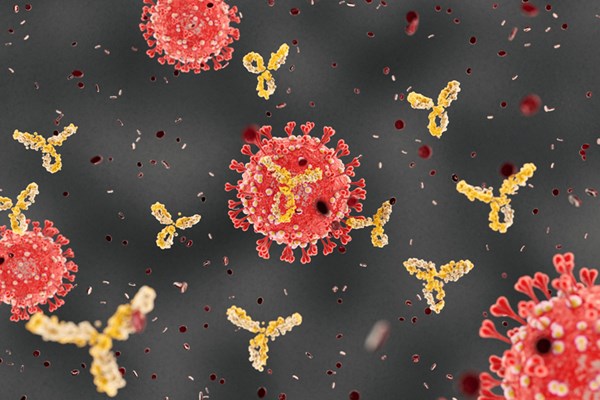ARTICLE
RECOVERY Collaborative Group. Convalescent plasma in patients admitted to hospital with COVID-19 (RECOVERY): a randomised controlled, open-label, platform trial. Lancet. 2021 May 29;397(10289):2049-2059.
OBJECTIVE
Assess the safety and efficacy of convalescent plasma treatment in patients admitted to the hospital with COVID-19.
BACKGROUND
Although the vaccination effort against SARS-CoV-2 is progressing in the United States and globally, the virus continues to pose a significant threat to infected patients to progress to hypoxic respiratory failure. This is of particular concern in countries with restricted access to the vaccine. Previous trials have shown a mortality benefit when treating severely ill COVID-19 patients with immunomodulatory therapy such as corticosteroids and IL-6 antagonists, while remdesivir has been shown in adults to shorten recovery time only.(1-3) In treating novel diseases such as COVID-19, passive immunization of patients with convalescent plasma is of interest due to its relatively quick availability and procurement process. Using neutralizing antibodies in the plasma during the early stages of infection may prevent the infection from progressing to critical illness while the patient’s humoral immune system is given time to mount an adequate response, which can be highly variable.
To further investigate the use of convalescent plasma in treating COVID-19, the Randomised Evaluation of COVID-19 Therapy (RECOVERY) Collaborative Group conducted a randomized control trial to determine if the use of convalescent plasma offered mortality benefit in hospitalized patients. Patients were randomly assigned to a usual care group or a usual care group that also received high-titer convalescent plasma. The potential impact of convalescent plasma on all-cause mortality was assessed after 28 days.
DESIGN
- Randomized, controlled, open-label platform trial performed at 177 NHS hospitals in the United Kingdom.
Study Selection and Inclusion Criteria:
- All hospitalized patients of any age with clinically suspected or laboratory-confirmed COVID-19 infection were eligible if they were without a medical history that placed them at significant risk to participate. Patient risk was determined at the discretion of the attending physician.
OUTCOMES
Primary
- 28-day all-cause mortality in hospitalized patients with COVID-19
Secondary
- Time to discharge from the hospital
- In patients not mechanically ventilated at time of randomization, rate of subsequent mechanical ventilation or death
Subsidiary
- Use of ventilation (non-invasive and invasive)
- Successful cessation of invasive mechanical ventilation
- Renal replacement therapy (renal dialysis or hemofiltration)
KEY RESULTS
Primary Outcomes
- No statistically significant difference in all-cause mortality at 28 days. 1399 (24%) of 5795 patients died in the convalescent plasma group and 1408 (24%) of 5763 patients died in the usual care group (RR 1.00, 95% CI 0.93-1.07; p=0.95)
Secondary Outcomes
- Median duration of hospitalization for the convalescent plasma group was 12 days (range 6 to >28). Median duration for the convalescent plasma group was 11 days (range 6 to >28).
- No statistically significant difference in rate of discharge from hospital within 28 days. 3832 (66%) of 5795 patients were discharged within 28 days in the convalescent plasma group and 3822 (66%) of 5763 patients were in the usual care group (RR 0.99, 95% CI 0.94-1.03; p=0.57).
- No statistically significant difference in rate of invasive mechanical ventilation or death. 1568 (29%) of 5493 patients were subsequently mechanically ventilated or died in the convalescent plasma group and 1568 (29%) of 5448 patients were ventilated or died in the usual care group (RR 0.99, 95% CI 0.93-1.05; p=0.79).
Subsidiary Outcomes
- No significant difference in the use of ventilation (invasive or non-invasive), successful cessation of mechanical ventilation, or need for renal dialysis or hemofiltration.
STRENGTHS
- Large, randomized control trial
- Follow-up rate of 99% of assigned patients
- 96% of patients in the convalescent plasma group received their first dose within 36 hours of randomization, limiting the potential modifying effect of time of dose
- Limited heterogeneity of effect among all subgroups
- Standardized titer for anti-IgG spike protein concentrations was used to prevent negative results due to low titer plasma
LIMITATIONS
- All participants were hospitalized, limiting the generalizability of results to the outpatient setting
- Patient population restricted to the UK, further limiting generalizability
- Antigenic variability of the SARS-CoV-2 virus may impact the efficacy of convalescent plasma if antibodies are a poor match with the infected patient
EM TAKE-AWAYS
In this large randomized controlled trial there was no evidence that high-titer convalescent plasma reduced all-cause mortality, reduced time to discharge from the hospital, or reduced the need for invasive mechanical ventilation among patients hospitalized with COVID-19 infection. These results were upheld when comparing data across subgroups of age, sex, ethnicity, duration of symptoms prior to treatment, level of respiratory support, and use of corticosteroids.
Although there did not appear to be a significantly increased risk for adverse events in the convalescent plasma treatment group, the results of this trial did not suggest a compelling use for convalescent plasma in treating patients hospitalized due to COVID-19. Immune system modulating treatment modalities such as IL-6 inhibitors (ie, tocilizumab) and corticosteroids remain as the more proven mechanism to improve survival in COVID-19 patients compared to treatments that directly target the virus.
References
- RECOVERY Collaborative Group, Horby P, Lim WS, et al. Dexamethasone in hospitalized patients with Covid-19. N Engl J Med. 2021; 384: 693–704.
- RECOVERY Collaborative Group. Tocilizumab in patients admitted to hospital with COVID-19 (RECOVERY): a randomised, controlled, open-label, platform trial. Lancet. 2021; 397: 1637–45.
- Beigel JH, Tomashek KM, Dodd LE, et al. Remdesivir for the treatment of Covid-19—final report. N Engl J Med. 2020; 383: 1813–26.




